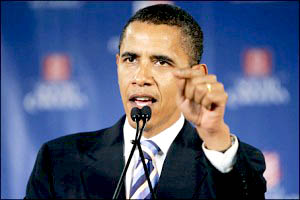Washington, Apr 8: US President Barack Obama has said that Americans are facing competition from India and China and exuded confidence that young Americans can match or exceed anything that they do.
 "You guys are all coming up in an age where you're not going to be able to compete with people across town for good jobs -- you're going to be competing with the rest of the world. Young people in India and China, they're all interested in trying to figure out how they get a foothold in this world economy," Obama said while addressing students in Maryland yesterday.
"You guys are all coming up in an age where you're not going to be able to compete with people across town for good jobs -- you're going to be competing with the rest of the world. Young people in India and China, they're all interested in trying to figure out how they get a foothold in this world economy," Obama said while addressing students in Maryland yesterday.
"That's who you're competing against. Now, I'm confident you can match or exceed anything they do, but we don't do it by just resting on what we've done before. We've got to out-work and out-innovate and out-hustle everybody else. We've got to think about new ways of doing things," said the US President.
Obama said he wants to make sure every student in America has a chance to get that moment.
"you're also going to be leading this country. That's the chance that this country gave to me and Michelle. And that's the chance I want for every single one of you," he said.
"From preschool for every four-year-old in America, to higher education for everybody who wants to go, every young person deserves a fair shot. I'm going to keep on doing everything I can to make sure you get that shot and to keep America a place where you can make it if you try," he said.
Obama announced to launch a new competition, backed by America's Departments of Education and Labor, to start redesigning some of high schools.
"We call it Youth CareerConnect. And we're offering USD 100 million in new grants to help schools and local partners develop and test new curricula and models for success. We want to invest in your future," he said.





Comments
Add new comment